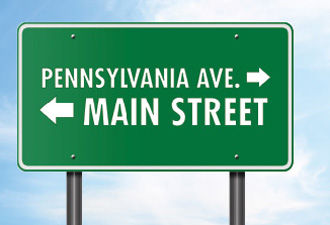Commentary

Small Business vs. Big Government
What is the third largest country in the world based on its production of output? It is America’s small businesses. Collectively, they produce half of our private Gross Domestic Product (the total value of final goods and services produced), employ over 60 percent of the private sector workforce, create the majority of new jobs in America, and “out patent” the larger companies in the economy (they are innovators).
Small business is the “R&D” of the U.S. economy. It is where new ideas, new products, and new methods are tested. If successful, the enterprise is rewarded with profits (to finance expansion) and imitation, as new competitors seek to capitalize on successes. It is the entrepreneurial spirit of America that has energized the economy and made it the most successful in history.
But small business is under assault. Historically, the job of the small business owner was to produce output for consumers at the lowest possible cost and create jobs. Over the years, Congress and state legislatures have steadily attempted to convert our nation’s small businesses into tools of social change. Unable to “sell” voters on financing their social agendas, governments have attempted to shift more and more of the cost of such programs to the nation’s small firms. The most valuable asset a small firm has is the time and energy of the entrepreneur. This has been slowly drained and diverted by government policies, higher taxes on the efforts of the private sector, more regulations, and mandates.
The health care bill just passed will further strain the resources of our small businesses, including such requirements as the issuance of 1099 statements for all transactions amounting to $600 or more (why is this in a health care bill?), and the construction of separate facilities where new mothers can nurse their babies in private (specifically excluding the use of bathroom facilities). It seems like every bill Congress passes is stuffed with these little trifles that are someone’s personal agenda and cumulatively drain the lifeblood (energy and resources) of small businesses.
It is no wonder, then, that for the past two years, small business owners have been in a funk. The National Federation of Independent Business (NFIB) has reported eight quarters of its Optimism Index with readings below 90. In comparison, during the 1980-82 recession, this reading was pierced in one quarter. Hiring and capital spending plans continue at 35-year-low levels. At the nadir of the 1982 recession, a net 47 percent of NFIB members expected business conditions to be better six months in the future. Today, that figure is -8 percent (8 percent more expect the economy to weaken than expect it to improve), 55 percentage points worse.
And yet the economy has grown for the past nine months and the “bottom” is thought by many observers to have occurred in July 2009. Indeed, the stock market is back.
So why are business owners so pessimistic? Uncertainty. And the major source of this uncertainty is government.
# # #
Dr. Bill Dunkelberg is the chief economist for the National Federation of Independent Business (NFIB) and a board member of the Commonwealth Foundation.
Click here for a related presentation on Small Business vs. Big Government by Dr. Bill Dunkelberg